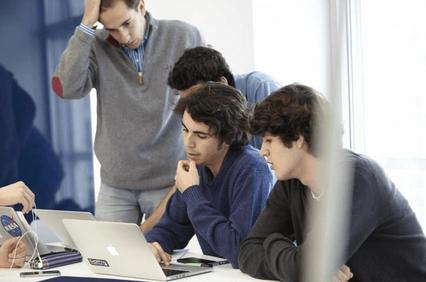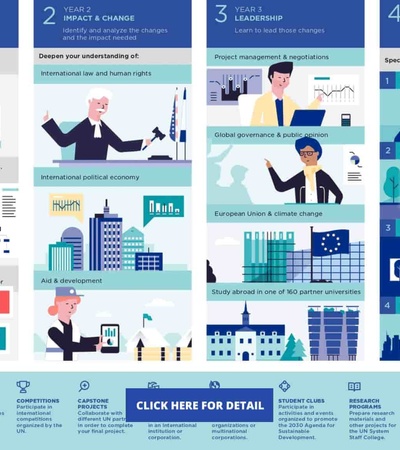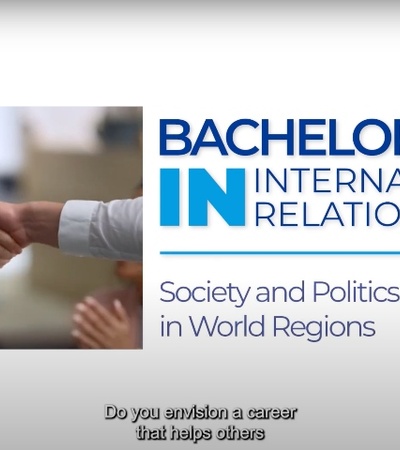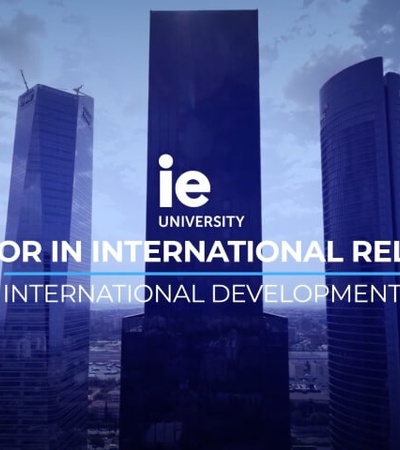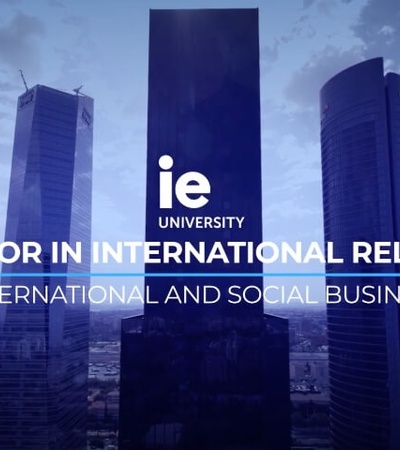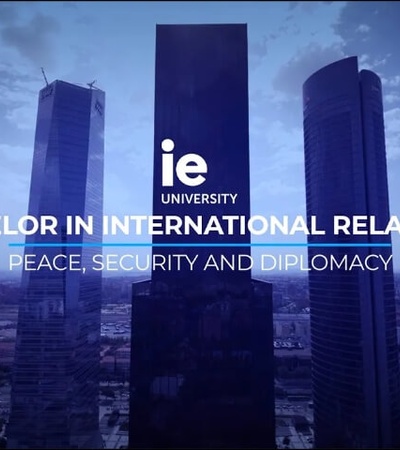Bachelor in International Relations
Bachelor in International Relations
Become an actor at a global level
- Home
- Studies
- Undergraduate Degrees
- Bachelor In International Relations
A UNIQUE BACHELOR IN INTERNATIONAL RELATIONS
A UNIQUE BACHELOR IN INTERNATIONAL RELATIONS
The study plan for the Bachelor in International Relations at IE University has been designed with the prestigious academic experience at its core, our academic faculty’s expert knowledge and research in each area, and the linkages between the University and the professional world.
The Bachelor in International Relations aims to provide young, ambitious individuals the necessary skill set to become professionals capable of facing real-world challenges.
Through our hands-on teaching methodology, students will find the ideal balance between what is studied throughout their degree and projects based on real-world scenarios.
This will allow them to develop profiles that can seamlessly adapt to new trends in the 21st century.

WANT TO KNOW MORE?
WANT TO KNOW MORE?
BACHELOR IN INTERNATIONAL RELATIONS STUDY PLAN
BACHELOR IN INTERNATIONAL RELATIONS STUDY PLAN
Quality
Quality
LEARN MORE ABOUT OUR BACHELOR IN INTERNATIONAL RELATIONS
LEARN MORE ABOUT OUR BACHELOR IN INTERNATIONAL RELATIONS
FIRST YEAR - GLOBAL CITIZENSHIP
Your first year will begin with a broad introduction to international relations, history, and economics. You will become aware of the global challenges and acquainted with the main periods and events that have shaped its history since the 16th century. We will provide you with the practical and methodological tools needed to understand and evaluate arguments about contentious issues in international affairs. Alongside this, you will be given the opportunity to complete an internship, contribute in one of the many IE labs, or both.
In this year, you will also start language courses and hone your ability to recognize and understand relationships; to analyse complex systems; to think of how systems are embedded within different domains and different scales; and to deal with uncertainty.
By the end of the year you will be able to apply economic and IR theories to your daily work, and understand important social and political phenomena, as well as different forms of international governance and organizations. You will also learn to be accountable, self-disciplined, and diligent, with an increased capacity for self-reflection and improved writing and communication skills.
SECOND YEAR - IMPACT AND CHANGE
In your second year you will continue to deepen your understanding of international relations from the perspectives of international law, international political economics, and international development. You will be introduced to the most innovative trends in economics, social inclusion, and environmental politics in order to understand how global challenges can be approached in a sustainable way.
You will also acquire the analytical skills that will allow you to research and analyze how to change and impact global challenges while cultivating an entrepreneurial mindset with regard to ideas and initiatives. By the end of the year, you will be more confident with discussing scholarly articles and communicating your own points of view in order to become an impactful change-maker.
Also, we offer you the opportunity to put everything you have learned into practice during your first two years in an amazing two-week journey in which you will visit different countries with your classmates whilst making an impact and learning.
THIRD YEAR - LEADERSHIP
During your third year you will focus on advanced international relations topics such as international trade, global governance, public opinion, and the European Union. Your first year was concerned with developing awareness about the most relevant global issues, and the second more focused on identifying and analyzing the changes and the impact needed. Now, in your third year, it is time to learn how to lead those changes. Therefore, you will also acquire the knowledge and the skills to solve international conflict, to manage projects in multinational corporations or in international institutions, to design successful partnerships, and to lead and negotiate trade agreements and diplomatic initiatives.
This year, you will be required to choose an exchange program with one of the 160 available partner universities around the world. You will also have the chance to participate in a one-day mock debate, where you will discuss and negotiate a range of issues related to international trade between the EU and the US.
FOURTH YEAR - EXPERTISE
Your fourth and last year is mainly focused on developing your expertise. You will have a broad array of subjects from which to choose your elective courses, with an added option to focus on a particular field of specialization and obtain an additional certificate from the school. Four academic tracks will be available for you: Global Affairs and Diplomacy; Peace, Conflict and Security; International Development; and International and Social Business.
In the second semester, you will carry out your final project, where you will apply all of the knowledge gained throughout your courses, internships, IE Labs, extracurricular activities, and exchange programs. You will have two options: either to complete an individual academic thesis, or to carry out a team consultancy type capstone project with a real client from the public or private sector. Each capstone project is unique and should be approached as a career-building exercise. The purpose is to test out your skills and knowledge in a realistic work environment, collaborating closely with your teammates to produce original and impactful research and strategic policy recommendations, and deliver these to your client.
THE BACHELOR IN INTERNATIONAL RELATIONS LEARNING JOURNEY
THE BACHELOR IN INTERNATIONAL RELATIONS LEARNING JOURNEY
Your path to career success unveiled through our engaging infographic: Explore it to discover more about the program structure!
BACHELOR IN INTERNATIONAL RELATIONS TRACKS
BACHELOR IN INTERNATIONAL RELATIONS TRACKS
We give you the chance to build your own career path.In the fourth year, you can choose from a range of electives which make up one of the four offered tracks entitling you to a supplemental diploma.
Technology, innovation, and sustainability are transversal dimensions across the entire curriculum. Students will also be able to take part in regional studies.
SOCIETY AND POLITICS IN WORLD REGIONS
The Society and Politics in World Regions track provides students with deep insights into the political systems, cultures and histories of key global regions. This track emphasizes how countries manage international relations, cooperate in multinational institutions and address societal challenges.
Focusing on Asia, Africa, South America, North America and the Middle East, and particularly on the dynamics of China, Russia, and India, students will gain specialized knowledge of how these regions influence global affairs.
IS FOR STUDENTS WHO ARE…
eager to explore regional politics, democracy, culture and ethnicity, and develop a nuanced understanding of the societal structures and political institutions shaping different areas of the world.
LOOKING FOR…
an opportunity to specialize in regional political systems and understand how countries interact with each other and within multinational frameworks, gaining the tools to address complex social and political issues at a global level.
TO BECOME…
- a diplomat
- an academic
- a consultant
- a government administrator
- a political systems expert
- a public affairs specialist
- a corporate diplomacy manager
INTERNATIONAL DEVELOPMENT
The International Development track deepens students’ understanding of the intricate factors at play in international politics, global development, economics and sustainability. With this knowledge, students will be prepared to manage international development projects and analyze the politics behind aid and international agreements.
IS FOR STUDENTS WHO ARE…
sensitive to the world’s most pressing issues and committed to creating a local and global impact by addressing poverty, inequality, sustainability, development and economic growth.
LOOKING FOR…
an opportunity to become leaders who understand how to bring people across the international community together to spur sustained economic growth while helping developing countries worldwide by discovering the keys to sustainable finance, building smart cities and the role of gender in international development.
TO BECOME…
- an academic
- a consultant
- a UN officer
- an NGO or foundation staffer
- a think tank analyst
INTERNATIONAL AND SOCIAL BUSINESS
The International and Social Business track teaches students how businesses expand and internationalize and the social impact that comes with them. In this track, students often engage with the expansion of multinational corporations or family businesses to explore the national and international scaling of the economic environment.
IS FOR STUDENTS WHO ARE…
keen to deepen their understanding of how businesses can have a social footprint. Students often want to become entrepreneurs and are committed to driving positive change in society. As a result, this track includes the opportunity to put their knowledge into practice as they explore social entrepreneurship.
LOOKING FOR…
a chance to explore the importance of sustainability, technology and innovation in today’s markets. Students will become familiar with what is driving change in international corporations and the opportunities introduced by the rise of social businesses.
TO BECOME…
- an international consultant
- an entrepreneur
- a professional within a multinational corporation
PEACE, SECURITY AND DIPLOMACY
Peace, Security and Diplomacy are core areas of international relations that need more decision-making from experts who understand how people and countries function in today’s rapidly changing society. This track examines the dynamics of peace, security and diplomacy around the world. Students will sharpen their negotiation skills and gain insight into alliance creation through real-world experiences. They will also acquire the tools for effective diplomatic communication and conflict resolution, preparing to navigate complex international diplomatic negotiations while fostering global cooperation.
IS FOR STUDENTS WHO ARE…
passionate about pursuing a career in diplomacy, international advocacy or defense to prevent, manage or resolve conflicts and improve international relations. Students will be excited to address the interlinkages between politics, technology and economics with global peace, security and diplomacy.
LOOKING FOR…
a deeper understanding of the forces underpinning diplomacy and the relationship between state sovereignty, international law and armed intervention. Through this track, students will shape an informed perspective on human security, human rights, humanitarian law, public diplomacy, cybersecurity and national branding.
TO BECOME…
- a diplomat
- a public administrator
- a consultant
- a legal advisor
- a defense staffer
- a multilateral organization manager
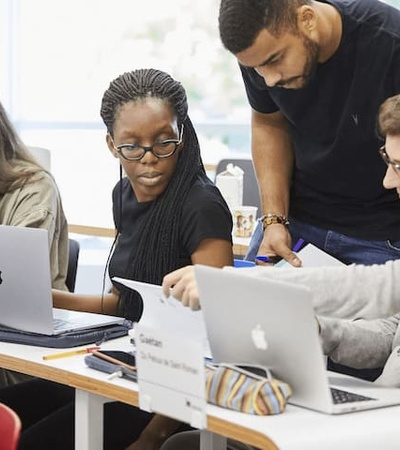
THE IMPORTANCE OF LANGUAGES
THE IMPORTANCE OF LANGUAGES
Languages are essential to a career in international relations. As a Bachelor in International Relations student, you will participate in a mandatory language course that lasts for six full semesters, consisting of 18 ECTS credits. In addition, we provide further opportunities to widen your linguistic ability, and you will have the option to learn Spanish, French, Portuguese, German, Arabic, or Chinese.
LEARNING A NEW LANGUAGE CAN OPEN UP A WORLD OF NEW OPPORTUNITIES
LEARNING A NEW LANGUAGE CAN OPEN UP A WORLD OF NEW OPPORTUNITIES
Languages are essential to a career in international relations. As a Bachelor in International Relations student, you will participate in a mandatory language course that lasts for six full semesters, consisting of 18 ECTS credits.
In addition, the Language Center at IEU is proud to offer students the possibility to study a wide range of languages, including French, German, Portuguese, Chinese, Arabic, Spanish, and English. With such a large variety of options, our students are able to personalize their academic path to meet their future career plans and objectives.

The Language Center at IEU
The Language Center at IEU
The Language Center helps students develop their multilingual communicative skills to help them flourish in the international labor market.
COMPETENCES
COMPETENCES
Basic competences
GENERAL COMPETENCES
- Develop arguments that demonstrate a critical understanding of political and social phenomena.
- Apply the knowledge acquired to develop interpretations of current economic phenomena and argue the case.
- Make use of historical and current documentary sources.
- Develop the technical IT competences necessary for a professional setting.
- Present a global vision with regards to trends and debates in international relations.
- Evaluate the economic dimension of international public and private policies.
- Plan and implement public and private policies at the international level, providing justification for their implementation.
- Use different information sources and channels to create and convey information, ideas, problems and solutions related to current international affairs.
- Train to conduct research and studies on the international sphere and its political, economic, social and cultural facets.
- Possess a critical understanding of the legal implications of international relations.
- Develop public- and private-sector strategies for real economic contexts.
- Communicate orally and in writing in both Spanish and English in a professional and academic context.
- Analyze and consider contemporary challenges and the social and cultural complexity of globalized society through a critical and creative lens.
- Apply suitable ethics-based judgements to all professional activities and relationships, with the ability to differentiate between personal and professional life.
- Apply and adapt knowledge and competences to a variety of international academic and professional contexts.
- Develop flexible problem-solving tools for organizational management that take the satisfaction of different stakeholders into consideration.
PROGRAM-SPECIFIC COMPETENCES
- Understand classical and contemporary political theories.
- Analyze and compare the structure and functioning of the main political systems.
- Recognize the paradigms, concepts and principles of political science.
- Understand microeconomic and macroeconomic models and obtain specific information from them.
- Be capable of identifying the key aspects of an economy and the operation of local and global markets.
- Understand international relations’ evolution as a discipline by placing it in the corresponding political, economic, legal and social contexts.
- Understand the historical dimension and evolution of the political and social processes hitherto in play in international relations.
- Produce, gather, analyze and interpret data and statistics.
- Understand the concepts, framework of application and theoretical foundations of international relations.
- Justify political and social stances in line with the discipline’s different theories.
- Understand the relationships between the different stakeholders in play as a function of a region’s current economic policy model.
- Understand the legal aspects and decision-making processes used as a part of nations and international organizations’ foreign policies in accordance with international law.
- Evaluate cases related to international jurisdiction, applicable law and the recognition and enforcement of judgements.
- Understand the structure, organization and operation of different types of international and supranational institutions, with particular focus on the European Union and the challenges it will face in the future.
- Analyze the course of global issues such as international terrorism, challenges in health and education and development cooperation.
- Understand and analyze the international economic environment and the economic dimension of international institutions using economic and financial tools in line with a given policy direction.
- Analytically connect past and current knowledge and processes through interdisciplinary analysis.
- Design communication strategies and apply political communication techniques.
- Apply the knowledge acquired to experimentation and the generation of new knowledge. Integrate and deploy all knowledge acquired throughout the program.
TRANSVERSAL COMPETENCES
- Identify the main cultural identity traits that characterize today’s world by understanding the main contemporary ideological trends.
- Behave professionally in accordance with the core principles and ethics of the profession.
- Manage unforeseen situations by being able to adapt to organizational changes.
- Use knowledge of the discipline to analyze and evaluate current situations.
- Form a part of interdisciplinary and multicultural teams to achieve shared goals in a diverse environment.
- Work actively in an international context.
APPLICABLE REGULATIONS OF THE PROGRAM
APPLICABLE REGULATIONS OF THE PROGRAM
Read our blog
Read our blog
FREQUENTLY ASKED QUESTIONS
FREQUENTLY ASKED QUESTIONS
How long does it take to get a bachelor's degree in international relations?
At IE University the Bachelor in International Relations takes 4 years to complete.
What do you study when you study international relations?
When you study international relations, you typically study topics such as international politics, international law, foreign policy, global economics, international organizations, conflict resolution, diplomacy, and global development. At IE University our program has a high component of United Nations activities and content. You can complete courses designed for UN staff through a tailor-made IE University online platform and receive certified diplomas.
Do you need to be good at math for international relations?
While there is some quantitative analysis involved in international relations, you generally do not need to be particularly good at math to succeed in the field. However, having basic proficiency in math and statistics can be helpful when working with data or conducting research.
Is international relations course hard?
International relations courses can be challenging, as they involve studying complex political systems, theories, and policies that can be difficult to grasp. However, with dedication and effort, many students find the material engaging and intellectually stimulating. Like any course of study, success in international relations largely depends on the individual's interest, effort, and study habits.
What is the core subject of international relations?
The core subject of international relations is the study of the relationships between countries and the interactions that occur on a global level. At IE University students get a real feel for the complexity of international relations as a global discipline with our multidisciplinary approach. They will explore topics such as the role of multilateral organizations, states, and the corporate world in shifting the international order through a variety of academic lenses, including social sciences, history, culture, economics, and politics.



